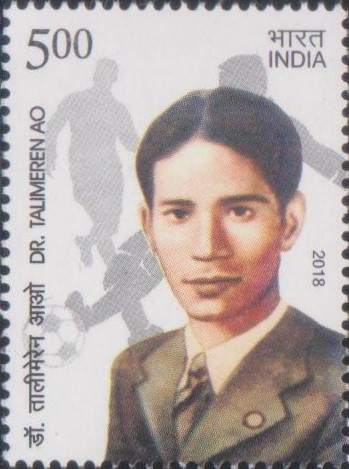
Dr. Talimeren Ao
A commemorative postage stamp on the Birth Centenary of Talimeren Ao, an Indian footballer and physician, captain of Mohun Bagan A.C. and Indian national football team (1948 Summer Olympics) :
 Issued by India
Issued by India
Issued on Jan 28, 2018
Issued for : Department of Posts is pleased to issue a Commemorative Postage Stamp on Dr. Talimeren Ao.
Credits :
Stamp/FDC/Brochure/Cancellation Cachet : Smt. Alka Sharma
Type : Stamp, Mint Condition
Colour : Multi Colour
Denomination : 500 Paise
Stamps Printed : 6.0 lakh
Printing Process : Wet Offset
Printer : Security Printing Press, Hyderabad
Name : Subongwati Talimeren Ningdangri
Born on 28 Jan, 1918 at Changki, Naga hills district, Assam, British India [now Nagaland, India]
Died on 13 Sep, 1998 at Kohima, Nagaland, India
About :
- Dr. Talimeren Ao was an Indian footballer and physician. He was born on 28 January 1918 in Assam, Naga hills in the village of Changki, in the then Naga Hills District of Assam.
- Dr. Talimeren Ao was captain of Mohun Bagan and Indian football team, flag bearer of the Indian Olympic contingent at the 1948 London Games and perhaps the most famous Naga. A phantom figure who hovers over the football history of free India, his footprints have faded but his name is resonant and powerful in the collective memory of his people.
- Two football tournaments are staged in his name. In Assam, where Talimeren grew up, there are two sporting venues named after him – an indoor stadium in Cotton College, Guwahati, where he studied, and an outdoor venue in Kaliabor, east of the Kaziranga National Park.
- At a time when the Indian Super League (ISL), India’s high-profile football league, has a team called North East United near the top of the points table, it’s worth re-telling the story of the region’s first footballing hero. At the beginning, there will always be Talimeren. The name means the all-glorious or all-mighty in the Ao language and, at 5’10”, he had the physique to back it up. Talimeren was a dominating presence in midfield and defence for nine seasons at Mohun Bagan (1943 to 1952), and a team-mate of Sailen Manna and Taj Mohammed at the London Olympics.
- Talimeren had to give up competitive football to pursue his medical career during the early years of independent India, returning home to Kohima as an assistant civil surgeon at the Civil Hospital in 1953. He retired as Nagaland’s Director of Health Services in 1978 and died in 1998 at the age of 80.
- Talimeren’s life is an implausible odyssey, an enormity of achievement over a short span of time while straddling a vast geography. From the hilltop village of Changki in the Ao tribe’s homeland of Mokokchung in Nagaland, to leading out free India’s first Olympic contingent in London, Talimeren traversed villages, towns, cities and nations.
- Football is central to his storyline. The sport found its way into his life at the age of six or seven, after the Baptist Reverend Subongwati moved his family from Changki to Impur, also in Mokokchung, as part of his missionary work.
- In Impur, Talimeren became his school’s football captain. His game started gathering strength in 1933, when he moved to high school at Jorhat’s Christian Mission School. From there, he moved to Guwahati’s Cotton College, where he was the leading all-round sportsman, collecting medals and trophies in athletics, volleyball and football.
- As a young footballer, he had an appetite for self-improvement. After watching Guwahati’s Maharana Club footballers train on the same ground as his college team, he asked them if he could join. Maharana, Guwahati’s biggest club at the time, turned the Cotton College striker into a defensive midfielder.
- The club were happy to put him up against their opposition, holding back the attacks on goal, and soon Talimeren was noticed as the man who had the temerity to mark and block the sublime Noor Mohammed of Hyderabad City Police. He soaked everything in, borrowing the training methods of better players, and earning a name for himself in the newspaper headlines and bright lights.
- Talimeren’s move from Guwahati to Calcutta, the heart of Indian football, came about after he earned a seat at the Carmichael Medical College (the present-day RG Kar Medical College). His friend from Maharana, Sarat Das, brought him over to Mohun Bagan in 1943, where he first paid a “joining fee” before working his way into their first XI. From then, it was juggling his medical studies and making his mark as a player, then on – within a year – to the Bagan captaincy and finally as India captain for the London Olympics and a short tour of Holland.
- At the Olympics, India almost upset France in their first match, missing two penalties in a 1-2 defeat. After the Olympics, on a tour of club matches in Holland, they beat Ajax Amsterdam 5-2 and of five games in England against club sides, won three and drew two.
- Legend has it that Talimeren was offered a year’s contract with Arsenal but he chose to return to India and continue his studies, earning his MBBS degree in 1950.
- As India captain, he naturally took on the role of leader, the team rallying behind his confidence. Under conventional Naga practice, Talimeren Ao’s name could have read Subongwati Talimeren Ningdangri in full – father’s name followed by son’s name followed by clan.
- Text : Based on the material received from proponent.


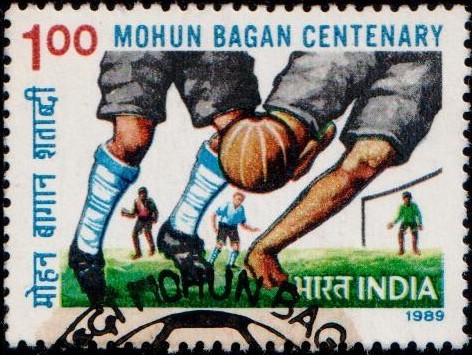

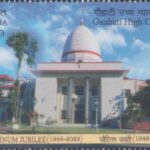
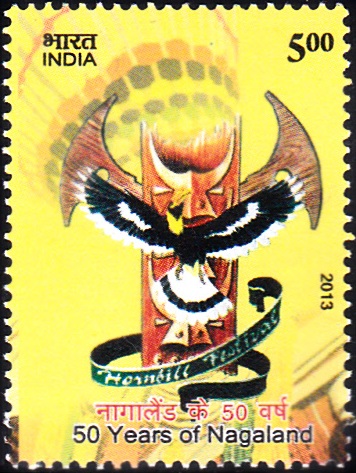
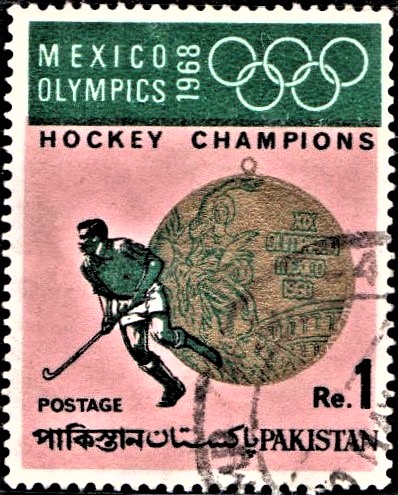
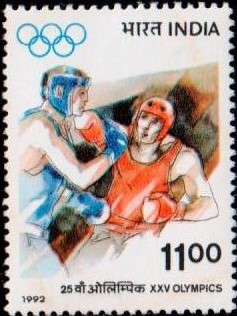
[…] award, musician Dr. Bhupen Hazarika who is a winner of the Dada Saheb Phalke award and footballer Telimaran Ao, Captain of India‘s first Olympic team were a few noted alumni of the […]